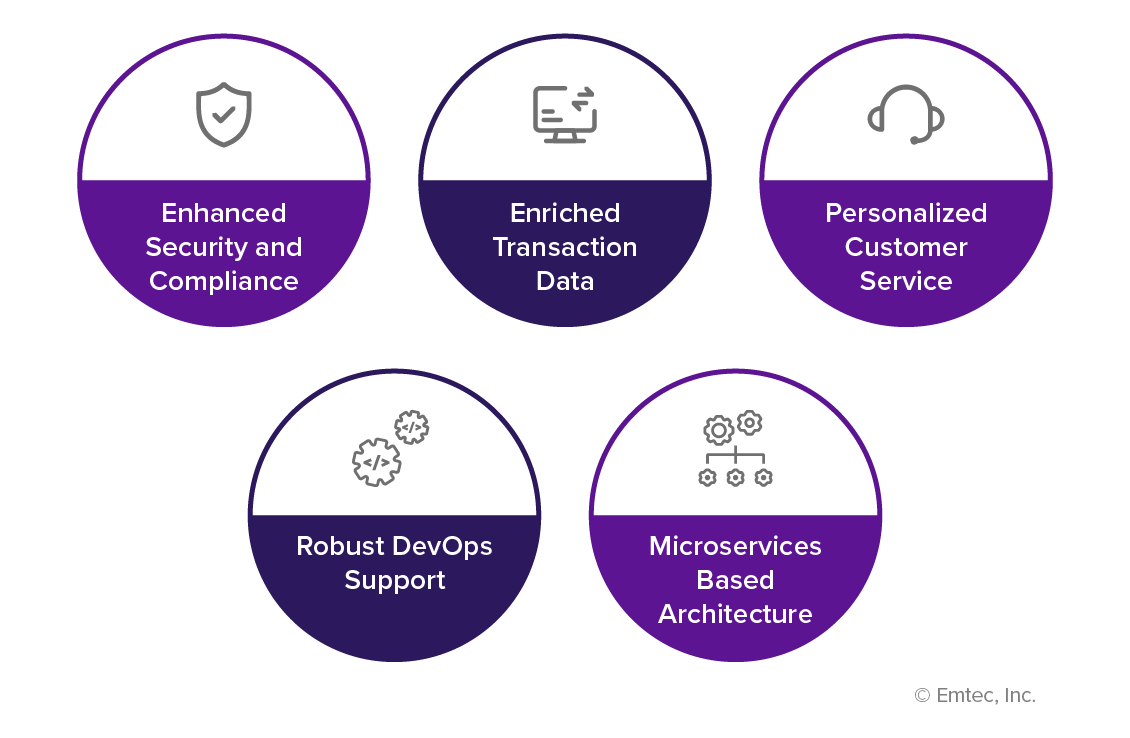The cloud-based architecture has become the de facto platform of digital innovation for financial technology services.
Fintech services have redefined the way consumers bank today. From mobile payments, to investment apps, to online-only banks, the “as-a-service” model is at the forefront of digital innovation. The global market for cloud-based Software-as-a-service was set to exceed 157 Billion in 20201, and there are now 10,605 fintech start-ups2 in the United States alone. Financial institutions are in a race to evolve out of legacy systems and into updated software models.
However, an entire migration into the as-a-service model is an all-consuming task. Most banks do not have the infrastructure or know-how to build tech stacks that can support the wide variety of functionality that digitally savvy customers desire. Plus, it is extremely time intensive and cost prohibitive to implement each individual digital service in house. Welcome to the era of banking platforms — one-stop-shops that can facilitate a host of financial software products. With cloud-based banking platforms, Fintech firms are reaching many more consumers via online channels, while digitizing their financial operations. As technology continues to mature, cloud-based banking platforms will become the standard.
The banking platform that has grown to become the most prevalent is Amazon Web Services (AWS). AWS’s ability to build and scale computing applications fits perfectly with the disruptive programs Fintech firms want to employ. Fintech is not held back by monolithic structures, and companies can quickly adopt the cutting-edge innovation of cloud-based hosting that AWS offers. With its enterprise capabilities (a 40 billion dollar run rate)3, ready-use security integrations, enhanced data processing, and lower Capex cost for scaling services, AWS is the ideal platform infrastructure for fintech businesses.
AWS and Fintech – a winning partnership
When selecting a banking platform, you are looking for expansive service functionality, without the hassle of creating in-house technology stacks. Financial services need robust digital solutions that allow you to keep up with the fast pace of digital innovation, while staying secure and keeping migration costs low. To that end, AWS offers several key benefits.

Security and Compliance
Cloud-based infrastructure helps companies publicly share information and services on a network (the whole concept of open banking). But that brings with it a whole host of security and compliance issues. Consumers who expect easy online access to their financial services also expect that their data will be kept safe — not to mention the series of regulations enacted by various governments worldwide.
AWS already has built-in compliance with PCI-DSS, HIPAA/HITECH, FedRAMP, GDPR, FIPS 140-2, and NIST 800-171. Plus, AWS has one-click cloud security tools, and it can integrate with third-party security APIs. Fintech firms can save a massive amount of time and resources by leveraging AWS’s readymade security and compliance architecture. Built-in compliance and a host of security integrations makes it easy for Fintech to scale without service interruptions.
Enfuce uses Amazon Elastic Block Store and Cloud Watch to enable seamless failovers — they now maintain a 99% uptime
Transaction Data
Rich insights gleaned from transactional data is a big reason why fintech companies can develop services that create better user trust and engagement. Enriched data stores and deciphers vast amounts of information beyond standard card transactions, helping create enhanced customer profiles. Fintech leverages these clear and categorized reports to determine client behavior. This in-depth understanding of your clientele gives you insights you can act upon. From improved risk management to better deployment of differentiated software services, transaction data drastically increases customer service opportunities. As only 9%4 of the world’s major banks are monetizing their payment data, those that capitalize on this opportunity will capture a bigger market share.
AWS provides several APIs within its platform architecture to create enriched data insights. Amazon Kinesis has real-time data processing, AWS Lambda cleans and categorizes data fields, and Amazon Relational Database Service can generate usable graphs.
AWS boasts that it can increase your data enrichment reporting by 27% compared to in-house builds, and it helped Fintech Monzo handle over 1 billion of transactions throughout the UK.
Ability to Scale Customer Service
Most fintech and financial services are B2C, which means that bringing services to market and scaling them to meet consumer demand is the benchmark of success. Cloud-based banking platforms have the necessary infrastructure to facilitate these personalized services. Open banking has brought entirely new customer service avenues; the financial institutions that can test, create, and scale those methods of communication will drive digital transformation (and enjoy rapid growth).
Not every cloud-based platform can handle the workload a financial institution may demand. Latency or service disruption can cause immense amounts of user friction, so virtual operating systems with hybrid setups need additional integrations to balance high traffic. Without the infrastructure in place to scale, the growth of your fintech may suffer. Scalable solutions lead to a hassle-free and frictionless user experience, helping drive consumer engagement. AWS has an auto-scaling feature to ensure performance during on-peak periods. AWS also features outposts that bring APIs and services into any virtual data center, so you can provide the services your customers want with low latency, backed by Amazon’s enterprise support.
Varo Bank successfully migrated their mobile application in eight weeks onto a cloud-based banking platform and shifted 1 million subscribers in the following three months.
Support for DevOps
DevOps is a crucial part of building and scaling a financial service, and the automation and resource allocation of Amazon CodeDeploy gives you the ability to streamline most engineering options. Amazon also brings siloed operations together with AWS Identify so that all stakeholders can support DevOps at the granular level. Leveraging AWS’s development tools helps increase workflows and team efficiency.
Deployable Microservices Architecture
AWS’s service-oriented architecture was the basis of microservices, and it delivers some of the best componentization—far better than any monolithic structures. Services can communicate easily between APIs, and each microservice can be implemented by DevOps teams as needed, helping increase speed to market, scalability, and faster product updates.
Technology fuels service diversification in fintech
Financial services firms that implement the application solutions offered by AWS can create new ways to communicate and engage with customers. Customers demand digital access to their finances, and the firms that meet that demand and offer better levels of service will enjoy increased customer satisfaction and retention.
Leveraging technology to create differentiated products and services
Digital lending, access to cryptocurrency, mobile payments, bill analyzers, card controls, and budgeting apps all offer levels of customer service that standard institutions cannot compete with. AWS allows Fintech to build and deploy these services to reach a broader audience.
Data Enrichment
By enriching the data collected via AWS, Fintech companies can quantify customer experience through their spend transactions and market a variety of pertinent services to high-priority clients based on this high-level data.
Data Science and Machine Learning
Rule-based systems of data collection are time-consuming and prone to error. Though it might take more time to implement, Machine Learning can increase the speed at which data is enriched and cleaned, enabling predictive services based on the collected information. This data can then be categorized to build better services with AI-driven insights.
Data Lake Solutions
AWS facilitates the storage of structured and unstructured data at scale. With that capability, companies can develop new analytics from log files, data strings, and even social media data stored in the data lake. Firms that can identify, analyze, and act upon their undefined data will be much better positioned to offer the personalized and unique services that their customers crave.
AWS drives digital transformation, but also complexity
Cloud-based platforms help firms harness the fast pace of innovation. However, they also bring a level of complexity magnified by stringent regulatory and compliance mandates (especially as security and privacy needs increase with the move to cloud-based hosting). Fintech firms also require a wide variety of services delivered at competitive prices to drive true business transformation and powerful customer experiences.
While technology platforms such as AWS can help facilitate a rapid launch of digital features for fintech firms, the sheer volume of enterprise solutions on the wish list can cause extreme overload on internal IT and development teams. How do you manage each service product roadmap, development, deployment, and optimization over time? A trusted AWS partner is critical for fintech companies that want to build future-ready applications at scale, without disrupting their current services.
At Bridgenext (former Emtec Digital), we helped Varo Bank (the first fintech to obtain a national bank charter) transition seamlessly from its mobile app to a secure, cloud-based banking platform. As a neobank with no physical branches, Varo wanted to offer customers easy and fast digital access to several application solutions. The Bridgenext team completed the migration with no disruption to Varo’s subscribers. The migration also provided Varo Bank with the opportunity to clean up backend code, introduce some new services, and incorporate “plug and play” applications that scale as they grow and meet the demands of their digital clients.
Conclusion
AWS is a premier enterprise solution and a robust platform that can help fintech firms develop and deliver innovative digital services to their customers. In a world where over 80%5 of consumers prefer digital banking, an advanced platform such as AWS can help your fintech firm migrate to a cloud-based, as-a-service model.
For fintech companies that want to elevate their services through banking platforms but struggle to make the switch to cloud-based infrastructure, a trusted partner who can alleviate the load and help engineer new services will make all the difference.
Ready to harness AWS and other digital tools for speed, agility, and growth? Contact Bridgenext Digital today.
References
https://www.statista.com/statistics/510333/worldwide-public-cloud-software-as-a-service/
https://www.statista.com/statistics/893954/number-fintech-startups-by-region/
https://www.crn.com/news/cloud/amazon-web-services-closes-in-on-40-billion-run-rate
https://thepaypers.com/payments-general/only-9-percent-of-major-banks-monetise-payments-data-report–1243574
https://www.consumeraffairs.com/news/online-banking-has-become-more-widespread-among-consumers-survey-finds-103119.html



